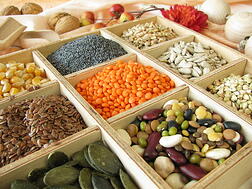Menu
- SITCM Overview
- Prospective Students
- Current Students
- Alumni
- Teaching Clinic
In Traditional Chinese Medicine (TCM), the stomach is associated with worry. Many people spend a good part of their day worrying about what they eat and how it affects their health and life.

Traditional Chinese Medicine focuses on restoring balance to the body. The five flavours of TCM, along with eating whole foods, can lead to better health for mind, body and spirit.
According to TCM, all foods have a nature and flavour. What is a food’s nature? It is the effect on the body’s temperature, which can be cool, cold, neutral, warm or hot. The body may have too much heat, for example, and you would eat more cool or cold foods to reach a healthy bodily stasis.
Each food also has at least one of the five flavours of TCM. These flavours include bitter, sweet, spicy/pungent, salty and sour. Many foods that you eat are sweet, not as in sugary but as in nurturing. Also, an excess of one flavour over the others can lead to imbalances in Qi, Yin and Yang as well as deficiencies in these or the organ systems.
Unfortunately, the western diet tends to favour added sugars and salts in overly processed foods. This excess can impact your health, but TCM also takes into account your heritage and ancestral Qi. In fact, Qi deficiency is thought to be at the root of many western health conditions, and chronic fatigue and stress can diminish your Qi.
Practically, the more you choose to include these flavours, the more balanced your nutrition in body, mind and spirit will be. Here is a quick overview of whole foods that you can include to better your whole health per TCM flavour:
Most meals will contain mainly sweet foods, but you can accomplish a wide range of flavours with the addition of condiments, sauces and side dishes. Meal balancing is most definitely an art. A colourful plate of whole foods is more appealing than yellow dye #5, anyway.
The combination of pungent spices can benefit your health, such as mixing turmeric and pepper to cleanse the blood, as pepper enhances the effectiveness of turmeric. Your sense of smell and taste are powerful, and including these five TCM flavours will make your meals more satisfying. Eating whole foods instead of processed foods will also ensure that you get a wide range of benefits that the body needs and deserves.
Curious about a TCM diet for better health? Contact us to schedule a consultation.